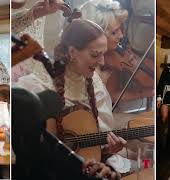By Meg Walker
07th May 2019
07th May 2019
When Mary Laura Philpott’s six-year-old son uttered one simple sentence, she thought long and hard about it and decided it could be applied to her everyday life.
“I miss you when I blink.”
It’s the perfect sentence, but I didn’t write it. My six-year-old did.
I was sitting at the desk in my home office, on a copywriting deadline for a client in the luggage industry, wrestling with a paragraph about suitcases. My little boy lay on his belly, “working” to pass the time until our promised walk to the park. He murmured to himself as he scribbled with a pencil stub on one of my notepads.
“…and I miss you when I blink…” he said. It stopped me mid-thought. “Say that again?”
“I miss you when I blink,” he answered, and looked up, pleased to have caught my attention. He turned back to his notepad, chattering on with his rhyme (I miss you in the sink… I miss you in a skating rink…). When he ripped off the page and tossed it aside, I picked it up and pinned it to the board on my wall.
I turned those words over in my mind while I folded laundry that afternoon. I thought about them while I brushed my teeth that evening. I repeated them to myself as I lay awake in bed. I said them out loud as I sat in traffic the next day.
Over the next several months, I saw the note on the wall every time I walked into my office, and the phrase lodged itself in my head like a song lyric. I played with the words when I had writer’s block, tossing them about like a stress ball. It would make a great title for a love poem, I thought, where the poet can’t stand to lose sight of his lover even for a second.
It was a few years later when it occurred to me: You could say it to yourself.
We all keep certain phrases handy in our minds. Not mantras exactly, but go-to choruses that state how things are, that give structure to the chaos and help life make a little more sense.
A friend of mine uses “not my circus, not my monkeys”. It helps her ignore her instinct to get involved in things that aren’t her business.
“No one’s getting out of here alive” is one of mine. I say it to myself when I’m marching along on the elliptical machine, because it reminds me that there absolutely will come an end to my time on earth, and if I want to push it off as far into the distance as I can, I need to get my heart strong and work off the sugar I consume every day. I say it to myself when I’m trying to calm down and deal with a jerk, because it helps me put things in perspective. We’re all going to die, and would I really die with more points if I took this person down, or should I have some empathy and grace and let our differences go?
Over time, “I miss you when I blink” became another one of these phrases. It helps me live in the moment. It slows me down and makes me absorb each instant instead of rushing, because I know already how much I miss things that happened in the past – how they’re right there behind my eyelids but also gone forever. When my now-teenage son is doing something very teenage son and I’m having to ask him for the eighth time to pick up his inside-out pants from the floor, “I miss you when I blink” helps me be more patient. He was six just a second ago. He’ll grow up and leave me in another second. “I miss you when I blink.” It captures the depths of my love. Could he have meant all this when he was little and scribbling, or was he just trying to rhyme with “sink”?
There’s no way he could have known. So he also couldn’t have realised how perfectly “I miss you when I blink” captures that universal adult experience: the identity crisis.
The old stereotypical identity crisis happens in midlife, to a man, and features a 25-year-old dental hygienist and a pricey sports car. The new stereotypical identity crisis happens to a woman, often when she’s turning 40, and involves either a lengthy stay in Tuscany or a very long hike. But the “I miss you when I blink” kind of identity crisis, that’s something else. Something under the radar, much more common.
For so many people I know, there is no one big midlife smash-up; there’s a recurring sense of having met an impasse, a need to turn around and not only change course, but change the way you are. It can happen anytime and many times. As we leave school and enter the real world, as we move in and out of friendships and romances, as we reckon with professional choices and future plans, and sure, when we hit midlife, but earlier and later, too.
I think this repeated need for recalibration happens partly because so many ways of being are pitched to us – particularly to women – as either-or choices: You can have a career or a family; be a domestic goddess or a train wreck; wear a blazer and tote a bullet journal or stick pencils in your messy bun and wipe paint on your jeans. Pious or profane. One thing or the other. Even whether or not you buy into those dichotomies seems to be an either-or proposition: You believe in “having it all” or you believe “having it all” is outdated bunk.
Our lives aren’t one suspended moment, a single either-or choice; they’re a string of moments, a string of choices. Going from one moment to the next is not always a comfortable process. Sometimes it hurts, like when you realise your child no longer needs you to be his daily sidekick, and you have to adjust to a new role in his life. Sometimes you know one phase of life is ending – you’ve outgrown a relationship or reached the end of a long project – but you don’t know what the next step is supposed to be. You feel sure you can’t go forward and you can’t go back and you absolutely, positively cannot stand still one minute longer, all of which is insanely frustrating.
That’s what small identity shifts look like in everyday lives.
The kind of crucial points in life I’m talking about are the ones that often go unseen, that most of us would feel embarrassed to call crises. They’re the ones a friend might talk about while sitting on your front steps after a dinner party, stalling because she doesn’t want to go home. Or because she hates her job. Or she’s scared something’s wrong with her kid or spouse. Or she just saw one of her notebooks from college in a drawer, and she feels so detached from the person who wrote those brilliant notes about Virginia Woolf, and she’s worried that smart 20-year-old has disappeared and she’ll never get her back. She misses herself when she blinks.
I miss you when I blink. I have felt it so many times in my life, at points where I didn’t really know who I was anymore, where I felt that when I closed my eyes, I could feel myself gone.
I still have that scrap of paper my son wrote on all those years ago, before I had any clue that what he was writing would become my touchstone. I didn’t know then what a versatile refrain it would become.
I use it all the time. When I feel pressure to do the one exactly right thing – which I feel all the time because I am a human and a perfectionist – I remember all the selves I simultaneously have been, am, and will be. I miss you when I blink means I know all my selves are here with me, and I know we can do this. Saying it to myself is like a coach pushing a player out onto the field and saying, “You’ve got it. Just do what we practised.”
Sometimes I think, Dammit, I will never be 15 or 25 or 35 again. Those lives I’ve lived are over. And I get a little wistful, thinking I might like to get some of that time back. But then I remember my 21-year-old self at my first job, feeling utterly confused and wishing she could disappear, and I think, Hey, young-me, it gets better.
And when I have anxiety attacks about the future – What if right now is the happiest I will ever be and I’m not appreciating it enough? What will I be doing in ten years? – I say I miss you when I blink to myself, and it means, Get a grip. Don’t panic. To figure out where to go next, look at where you came from. If you got here, you can get to the next thing.
Sometimes, in moments of memory or daydream, I feel the different iterations of myself pass by each other, as if right-now-me crosses paths with past-me or imaginary-me or even future-me in the hallways of my mind. “I miss you when I blink,” one says. “I’m right here,” says the other, and reaches out a hand.


Extracted from Mary Laura Philpott’s book, I Miss You When I Blink: Dispatches from a Relatively Ordinary Life (Murdoch Books, approx €17.50), out now.
Portrait of Mary Laura Philpott by Heidi Ross
Main photograph by Annie Spratt/Unsplash























